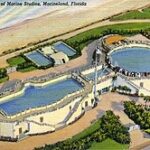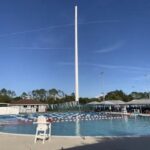On Tuesday, June 17th, the Palm Coast City Council convened at City Hall for a comprehensive business meeting covering a range of city matters, including impact fees, historic grant allocations, and a significant development proposal. The meeting began routinely with the pledge of allegiance and a moment of silence, followed by public participation where residents voiced concerns and praises. Several residents highlighted issues related to city infrastructure.
Jeannie Dwarte from the C-section raised concerns about water drainage problems around Jeremy’s home, pointing out evidence of water backing up between residences and retention canals, indicating failing infrastructure. She criticized recent city expenses, including budgeting over $68,000 for an assistant manager and over $330,000 for surveillance contracts. At the same time, impact fees were being raised, suggesting these financial decisions contradict claims of fiscal responsibility. She also expressed frustration over the lack of transparency regarding 5G cell towers near fire stations, citing potential health risks for nearby residents and firefighters.
In contrast, Manly Couns praised city employee Melissa Hill for effectively resolving drainage issues near his home within five months, a process that had been delayed for two years prior. However, he reported ongoing wastewater problems in his neighborhood, causing toilet backups and unpleasant odors, urging the city to address these promptly to avoid affecting home sales. The council also heard from Mark Stansel, giving praise for the recently completed eastbound right-turn lane on State Road 100 onto Seminole Woods, but urged action on a pending right-turn lane on Seminole Woods itself, which remains a traffic concern.
City Council members and staff addressed technical challenges from the previous week, including an internet outage affecting live meeting streaming. It was clarified that the issue stemmed from poor upload speeds, and the city has since switched temporarily to a backup internet provider. Significant discussion centered on the proposed updates to city impact fees for fire rescue, parks and recreation, and transportation. The council reviewed comprehensive studies supporting these changes, including adjustments based on dwelling unit size and extraordinary circumstances like infrastructure needs and inflation.
Carl Cody, Director of Stormwater Engineering, and consultant Jonathan Paul detailed the fee structure, noting increases ranging from approximately 73% for parks and recreation to over 115% for transportation impact fees, with fees calculated per dwelling unit and accounting for factors such as square footage and trip generation rates. Vice Mayor Ponti raised concerns about exemptions related to accessory dwelling units (ADUs) in the impact fee code, emphasizing the importance of not exempting ADUs since they could increase infrastructure demand. The council agreed to amend the ordinance so that ADUs would be treated as additional dwelling units for fee purposes, ensuring future developments are properly accounted for.
Debate arose around the treatment of ITT (Island Transportation and Terminals) platted lots, which currently pay reduced impact fees due to pre-existing infrastructure. Some council members expressed surprise at this arrangement and questioned its fairness, given recent efforts to keep housing affordable. In response, the council moved to eliminate this special rate, advocating for equity among all residential lots. Several members of the public, including representatives from the Flagler Homebuilders Association and residents, expressed varied opinions on the impact fee increases. Some argued that infrastructure costs have stabilized or slowed, questioning the necessity of large increases, while others highlighted the need to invest in expanded park facilities and recreational fields to meet the city’s growing population demands.
The city council also approved a proclamation designating the week of June 15, 2025, as National Mosquito Control Awareness Week. Mike, from the East Flagler Mosquito Control District, emphasized the dangers mosquitoes pose as the deadliest animals globally and urged residents to eliminate standing water around their homes to control mosquito breeding.
Further in the meeting, an ordinance amending the city’s exterior paint color regulations was introduced, aimed at allowing additional light Bermuda colors suitable for the region, balancing aesthetic standards with homeowner preferences. Enforcement processes for code violations like improper paint colors were discussed, with staff explaining the current mechanisms, including notices, code board hearings, and potential fines, while acknowledging the need for clearer enforcement authority and timelines.
The council received a site plan proposal for a technical tier-3 development called King’s Crossing, involving the construction of two storage buildings on approximately 38 acres near Old Kings Road. The proposed plan includes careful mitigation measures for wetlands and floodplains, including compensatory stormwater storage to prevent increasing flood risks. Staff confirmed that the project complies with zoning and comprehensive plan requirements and minimizes environmental impact. The planning board recommended approval unanimously, and the council voted in favor despite one dissenting vote.
The council also approved contracting with Plant & Morgan PLLC to conduct a comprehensive one-year entity-wide risk assessment to evaluate operational, strategic, financial, and compliance risks, aiming to improve efficiencies and risk mitigation efforts. Public comment on cultural grant funding revealed tensions concerning the Flagler County Cultural Council (FC3) and the Palm Coast Historical Society’s applications. The Palm Coast Historical Society withdrew its grant request, citing perceived biases and unfair scoring during evaluations, though other cultural organizations scored highly. Council members expressed a desire to revisit and improve the cultural grant process, emphasizing the importance of equitable funding and community support for local arts and history.
The meeting adjourned after approving the consent agenda with unanimous support and addressing final comments about ongoing infrastructure concerns, with the city observing the federal Juneteenth holiday the following Thursday.










ITT (International Telephone and Telegraph)